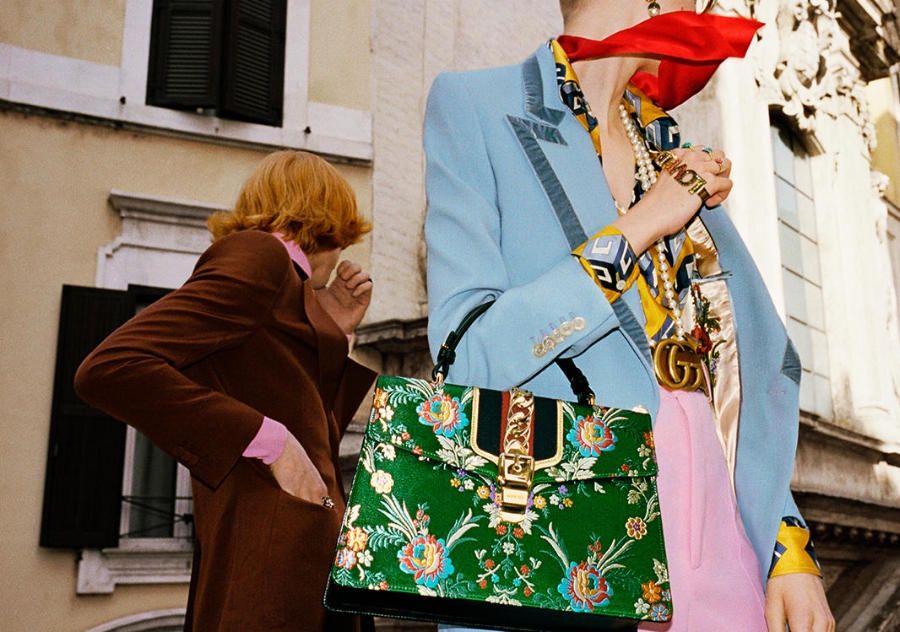
image: Gucci
“Forever 21 has no evidence!” That is essentially what Gucci is arguing in the latest round of the ugly legal battle at play between the two brands, which reside at opposite ends of the fashion spectrum. Gucci is fighting Forever 21’s attempt to have a number of its federally registered trademarks invalidated, after the fast fashion retailer filed suit against it in June. Forever 21 asked a federal court in Los Angeles to hold that it is not infringing Gucci’s trademarks by selling garments and accessories bearing both red and green, and red and blue striped accents.
The Los Angeles-based fast fashion giant is also asked the court to invalidate the Gucci trademark registrations at issue (at least nine different trademark registrations), along with any pending applications for related marks.
Forever 21 alleged in its complaint early this summer, “Many clothing and accessory items adorned with decorative stripes colored blue-red-blue or green-red-green are sold by countless third parties … The colors red, blue, and green, and stripe designs, are among the most favorite, popular and widely used colors and design features on clothing.” With this in mind, Forever 21 concludes that “Gucci should not be allowed to claim that [it], alone, has a monopoly on all blue-red-blue and green-red-green striped clothing and accessory items.”
In a follow-up filing to its motion to dismiss – the latter of which Gucci filed in August, asking the court to throw out a number of Forever 21’s claims, including the one in which Forever 21 is seeking to cancel Gucci’s striped trademarks – the Italian design house’s counsel alleges that Forever 21 cannot make such claims without providing proof, which it has not done.
Specifically, Gucci states that Forever 21 has failed to establish that any other parties are, in fact, using Gucci’s blue-red-blue and green-red-green striped trademarks. This is an important point, as Forever 21’s key argument in asking the court to cancel Gucci’s trademarks is based on the alleged fact that Gucci’s striped marks “lack secondary meaning, are aesthetically functional, or are generic.”
(Learn more about trademark genericization – and how Chanel is aggressively fighting it – here).
But, as Gucci notes, Forever 21 cannot just claim that its blue-red-blue and green-red-green marks are generic (and therefore, up for grabs to any brand that wants to use them on garments and accessories). Forever 21 needs to prove that by specifically showing that a number of other brands are, in fact, using the same marks, and thus, the stripes do not serve to identify the Gucci brand. (The purpose and strength of a trademark, after all, is its ability to indicate to consumers the source of a particular product).
As Gucci states in its latest motion, Forever 21’s argument for invalidation assumes that “clothing with the striped pattern at issue [is] commonly available,” and yet, the fast fashion brand has not provided any evidence of such uses. “A complaint … that fails to identify the alleged third-party users or describe their allegedly similar products, must, on its face, be dismissed,” per Gucci.
Forever 21 filed the suit at hand after Gucci first sent it a cease and desist letter in December 2016, demanding that Forever 21 cease all sales of garments and accessories bearing blue-red-blue and green-red-green stripes – as Gucci maintains federal trademark protection for those specific stripe combinations (and has for some time now, with registrations dating back to 1979).
Gucci’s initial cease and desist letter was followed by two more letters from Gucci in January and February 2017, respectively, threatening to file suit if Forever 21 did not remove the allegedly infringing garments and accessories, namely, three bomber jackets, one sweater, and a choker necklace, from its stores and e-commerce websites.
Forever 21 responded by filing a declaratory judgment action against Gucci, after filing a very suit lawsuit against adidas just a few months prior.
The Italian design house has said in a statement, “Gucci has asked the Court to dismiss the spurious claims that Forever 21 lodged on June 26, 2017, and has brought counterclaims against Forever 21 for willful trademark infringement, trademark dilution and unfair competition. Gucci’s renowned blue-red-blue and green-red-green stripe webbing trademarks have been iconic codes of the House of Gucci for more than fifty years, following their introduction in 1951 and 1963 respectively, with the first U.S. trademark registration of the webbing dating back to 1979.”
The spokesman went on to note, “Despite Forever 21’s attempt to use its lawsuit to intimidate Gucci into ceasing its trademark enforcement efforts, Gucci is as committed as ever to protecting its long established intellectual property rights, which are at the heart of the brand’s identity, and to ending once and for all Forever 21’s reprehensible exploitation of its distinctive trademarks and those of other brands who have suffered the same type of piracy.”
Finally, “Gucci considers the defense and enforcement of its celebrated trademarks of paramount importance in protecting its customers from those who wish to knowingly profit from deception and confusion.”
* The case is Forever 21, Inc. v. Gucci America, Inc., et al., 2:17-cv-04706 (C.D.Cal).







